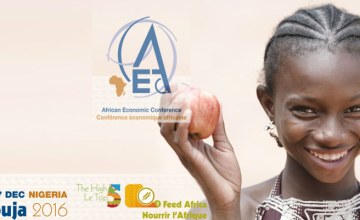A study by Namalguebzanga Christian Kafando, one of the paper presenters and discussants at the ongoing 11th African Economic Conference in Abuja has shown that there is a significant link between agriculture and manufacturing in Africa.
The study, entitled "Is the Development of the Agricultural Sector Affecting the Manufacturing Sector" ("Le Développement du secteur agricole affecte-t-il le secteur manufacturier ?"), was presented by Kafando in "Session 2.4: Agriculture and Industrialization" on Day 2 of the conference, which is organized each year by the African Development Bank (AfDB), the UN Economic Commission Africa (ECA) and the United Nations Development Programme (UNDP). The theme of this year's edition is "Feeding Africa: Towards Agro-Allied Industrialization for Inclusive Growth."
Kafando posits that African nations have the potential to develop their manufacturing sector if more attention can be invested in agriculture.
Based on his study conducted on 37 countries in Africa, he argued that agriculture affects manufacturing in South Africa, West Africa and East Africa, whereas in North Africa, agriculture and manufacturing grew on the same index.
Kafando appealed to governments of African countries to also focus on training to build capacity, adding that policies capable of developing the manufacturing sector and transfer of knowledge should be established.
Sharing the same argument, Soteri Gatera, ECA Chief, Industrialization and Infrastructure Section, Regional Integration and Trade Division, said if agriculture can be developed alongside the entire value chain, it would boost the manufacturing sector and create jobs.
He emphasized need to give more attention to the processing of raw agricultural produce rather than exporting unprocessed agricultural commodities.
According to him, through processing, African countries would be doing its population great help by creating more wealth and creating well-paying jobs for the most vulnerable populace.
"Agricultural foods like many other commodities, in its raw form fetch very low prices but with value-addition, we transform the primary commodity into higher value to fetch much higher prices. For instance, cassava can be transferred into powder form and can be used as plaster of Paris (POP). It can be used for some pharmaceutical regents.
"When it is in this form of pharmaceutical regents, you can imagine the value of one kilogram of that regent; it will be more expensive. So also the price of one kilogram of POP made from cassava. Value addition creates more wealth," Gatera noted.
However, participants at the session expressed concerns on financing, which could be a major bane to developing the agriculture sector.
In his reaction to the concern over finance, Gatera said governments should be willing and ready to create good economic policies that would encourage processing of agricultural commodities into value additions.
Gatera, who chaired the session on agriculture and industrialization, restated that the nexus between agriculture and manufacturing is value addition.
He said instead of exporting jobs, through processing of raw agriculture commodities, African nations could create better jobs for the people.
"There is no way we can sustain our economy or engage our population if we don't add value through industrialization. Industrialization should be taken as a pathway for economic transformation, so for this to happen, we need to make an overhaul of our economic policies including banking policies," he added.


